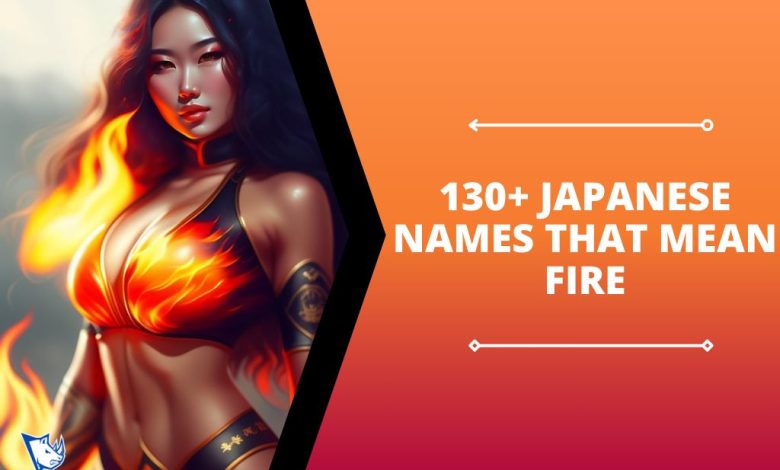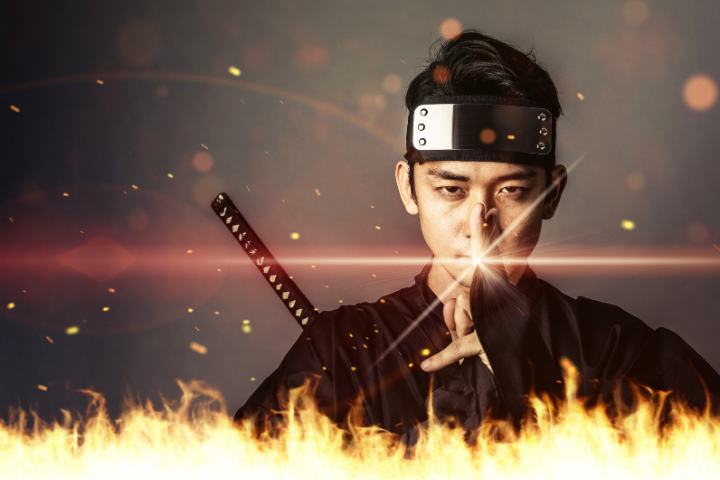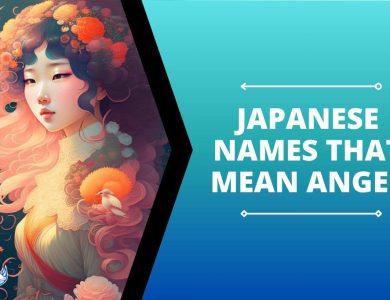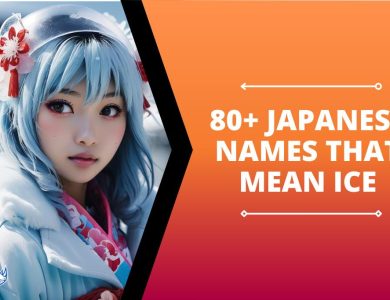130+ Japanese Names That Mean Fire

Have you ever wondered about the meaning behind Japanese names? Japan has a rich cultural heritage, and names often hold deep significance. In this article, we will explore the fascinating world of Japanese names that mean fire.
Fire is a powerful element, symbolizing passion, strength, and transformation. We will delve into the meanings and origins of these names, their cultural significance, and their popularity in modern Japan.
So, if you’re curious to learn about the fiery names that have captivated the Japanese people throughout history, read on!
Japanese Boy Names That Mean Fire
Here are some Japanese boy names that have meanings related to fire:
Hiroyuki (寛之): Meaning “broad, generous fire.”
Katsuro (勝郎): Signifying “victorious son of fire.”
Akifumi (明文): It translates to “bright fire.”
Rinjiro (臨二郎): Meaning “second son of the approaching fire.”
Kaen (火炎): Directly translates to “flame” or “blaze.”
Ensho (炎照): Signifying “shining flame.”
Homura (焰): It means “flame” or “blaze.”
Hiromasa (寛正): Meaning “righteous and broad fire.”
Akio (照夫): Signifying “man of brightness and fire.”
Rentaro (煉太郎): Meaning “son of the refining fire.”
Taiki (大火): It translates to “big fire.”
Kaoru (香火): Signifying “fragrant fire.”
Ranmaru (乱丸): Meaning “wild and round fire.”
Akifusa (燐房): It means “house of phosphorus,” associated with fire.
Enjiro (炎二郎): Signifying “second son of the flame.”
Kaji (火事): Directly translates to “fire” or “conflagration.”
Akimitsu (秋光): Meaning “autumn light,” associated with the warmth of fire.
Hironori (宏則): Signifying “principle of a vast fire.”
Kazan (火山): It translates to “volcano.”
Rinji (燐二): Meaning “second son of phosphorus,” related to fire.
Akiryo (明了): Signifying “clear and bright fire.”
Renzo (煉造): It means “forging fire.”
Taito (大灯): Directly translates to “big lamp” or “big fire.”
Kaenji (火炎寺): Meaning “temple of flames.”
Enshin (炎心): Signifying “heart of flame.”
Homuru (焰): It translates to “flaming” or “burning.”
Hiroyasu (寛康): Meaning “healthy and broad fire.”

Akito (燕人): Signifying “man of the dawn fire.”
Rento (煉砂): Meaning “sand for refining,” related to fire.
Taiko (大光): It means “big light” or “big fire.”
Kaede (火炎手): Signifying “fire hand.”
Ransei (乱星): Meaning “wild star,” associated with the brightness of fire.
Akifuyu (秋冬): It translates to “autumn and winter,” symbolizing the changing seasons and fire’s warmth.
Enkai (炎海): Signifying “sea of flames.”
Honoo (炎): Meaning “blaze” or “flame.”
Hiroshi (宏): It means “vast” or “broad,” which can be associated with fire’s intensity.
Kazanari (火山成): Signifying “born from a volcano.”
Rinko (燐光): Meaning “phosphorescent light,” linked to fire’s glow.
Akitoshi (秋敏): It translates to “autumn and cleverness,” connecting with fire’s transformative qualities.
Ensui (炎水): Signifying “fire and water.”
Honoka (炎花): Meaning “flame and flower.”
Hiroto (宏斗): It means “vast and big dipper,” associated with the brightness of stars and fire.
Kazuma (火妙): Signifying “marvelous fire.”
Rokuro (炉黒): Meaning “blackened by the hearth,” linked to fire’s presence in the home.
Akisuke (秋介): It translates to “autumn and assistant,” symbolizing fire’s supportive role.
Enya (炎夜): Signifying “night of flames.”
Hozumi (帆火): Meaning “sail and fire,” representing fire’s role in propulsion.
Kaito (火燈): It means “fire torch” or “fire light.”
Ryoji (炉司): Signifying “steward of the hearth,” emphasizing fire’s importance in the household.
Akizora (秋空): Meaning “autumn sky,” where fire often finds its place in the form of stars and warmth.
Japanese Girl Names That Mean Fire
Here are a few Japanese names that mean Fire for your baby girl:
Hinata (陽向): Meaning “toward the sun” or “sunny place.”
Kaen (火炎): Signifying “flame” or “blaze.”
Honoka (炎花): It translates to “flame and flower.”
Akari (灯り): Meaning “light” or “brightness.”
Rinka (燐火): Signifying “phosphorescent fire.”
Enju (炎樹): It means “flame tree” or “firewood.”
Kaguya (火具矢): Meaning “fire equipment” or “fire arrow.”
Kazumi (火澄): Signifying “clear fire” or “pure flame.”
Hiromi (宏美): It translates to “vast beauty” and can be associated with the beauty of fire.
Akane (茜): Meaning “deep red” or “madder red,” resembling the color of fire.
Tomoyo (灯代): Signifying “eternal light” or “eternal fire.”
Ran (燐): It means “phosphorus” or “fire,” associated with the element.
Hinoka (火之香): Meaning “fragrance of fire.”
Kaede (火炎手): Signifying “fire hand.”
Akino (秋乃): It translates to “of autumn,” connecting with the season’s warmth and fireplaces.
Rin (燐): Meaning “phosphorus” or “fire.”
Akiko (明子): Signifying “bright child,” often linked to the brightness of flames.
Ayaka (綾火): It means “design and fire,” symbolizing the artistry of fire.
Honoo (炎): Meaning “blaze” or “flame.”

Kaname (火滅): Signifying “extinguishing fire” or “putting out flames.”
Kaori (香織): It translates to “fragrance weaving,” reflecting the scent of burning wood.
Mizuka (炎香): Meaning “flame fragrance.”
Aika (藍火): Signifying “indigo and fire,” blending the color and warmth of fire.
Hinako (陽菜子): It means “sunny vegetable child,” evoking images of warmth and growth.
Akira (明): Meaning “bright” or “clear,” related to the brightness of fire.
Rinko (燐光): Signifying “phosphorescent light,” linked to fire’s glow.
Natsuko (夏子): It translates to “summer child,” when firelight often dances in the night.
Homura (焰): Meaning “flame” or “blaze.”
Kagerou (陽炎): Signifying “heat haze” or “shimmering heat,” resembling the effect of fire.
Kazane (火珠音): It means “fire, pearl, sound,” representing the crackling of flames.
Akie (秋江): Meaning “autumn river,” where firelight can reflect beautifully.
Ayako (彩火子): Signifying “colorful fire child,” emphasizing the vibrant nature of fire.
Rika (璃火): It translates to “glass and fire,” symbolizing fire’s transformative qualities.
Tomomi (灯美): Meaning “beautiful light” or “beautiful fire.”
Hinako (日向子): Signifying “sunny child,” evoking images of fire’s warmth and light.
Akiko (秋子): It means “autumn child,” associated with the season’s cozy fireside moments.
Kazusa (火涼): Meaning “fire and coolness,” representing the contrasting nature of fire.
Tsubaki (椿): Signifying “camellia,” which can evoke images of fiery red blooms.
Akihiko (秋彦): It translates to “autumn prince,” connecting with fire’s warm embrace during the season.
Yuuka (夕火): Meaning “evening fire,” associated with the gentle glow of twilight.
Honami (炎美): Signifying “beautiful flame.”
Haruka (春火): It means “spring fire,” relating to the renewal and vitality of fire.
Kazuko (火鈴子): Meaning “fire bell child,” evoking imagery of fire alarms.
Konomi (火乃美): Signifying “fire and beauty.”
Ayumi (綾美): It translates to “design and beauty,” reflecting the artistry of fire.
Riko (璃火子): Meaning “glass and fire child,” symbolizing fire’s transformative qualities.
Haruko (春子): Signifying “spring child,” associated with the warmth and renewal of the season.
Kaiko (火粉子): It means “fire powder child,” possibly alluding to sparks or embers.
Hikari (光): Meaning “light,” which can be associated with the brightness of flames.
Kaoru (香火): Signifying “fragrant fire.”
Unisex Japanese Names That Mean Fire
Here are 30 unique unisex Japanese names that have meanings related to fire:
Hibiki (響): Meaning “echo” or “sound,” which can be associated with the crackling of fire.
Akaji (赤地): Signifying “red ground,” resembling the color of fire.
Kaika (火花): It translates to “spark,” evoking imagery of flames.
Enka (炎香): Meaning “flame fragrance.”
Kagerou (陽炎): Signifying “heat haze” or “shimmering heat,” resembling the effect of fire.
Akanemaru (赤根丸): It means “round red root,” symbolizing the fiery core.
Kazen (火善): Meaning “good fire,” emphasizing the positive qualities of fire.
Homuri (焰): Signifying “flame” or “blaze.”
Ransei (乱星): It translates to “wild star,” associated with the brightness of fire.
Akatora (赤虎): Meaning “red tiger,” relating to the fierce and fiery nature.
Kaifuku (火復): Signifying “fire recovery” or “fire restoration.”
Enishi (炎詩): It means “flame poetry” or “poetry of fire.”
Kazekaze (火風): Meaning “fire and wind,” symbolizing the dynamic nature of fire.
Taiyohi (太陽火): Signifying “sunfire,” connecting with the radiant energy of the sun.
Akatsuki (暁): It translates to “dawn” or “daybreak,” when fire often plays a prominent role.
Ranju (燃樹): Meaning “burning tree,” evoking images of a fiery forest.
Kazane (火珠音): Signifying “fire, pearl, sound,” representing the crackling of flames.
Enkai (炎海): It means “sea of flames.”
Hikaru (光): Meaning “light,” which can be associated with the brightness of flames.
Kaenji (火炎寺): Signifying “temple of flames.”
Rinka (燐火): It translates to “phosphorescent fire.”
Akusai (赤災): Meaning “red calamity,” emphasizing the destructive aspect of fire.
Ranho (燃宝): Signifying “burning treasure,” symbolizing the value of fire.
Kazoku (火族): It means “fire tribe,” suggesting a community united by fire-related practices.
Taimatsu (松明): Meaning “torch” or “bonfire.”
Akenuki (赤抜): Signifying “red extraction” or “red purification.”
Enyoku (炎翼): It translates to “flame wings,” symbolizing the fiery spirit.
Kaisen (火戦): Meaning “fire battle” or “battle with fire.”
Ranbun (燃文): Signifying “burning script” or “script of fire.”
Kazetsuki (火月): It means “fire and moon,” representing the contrast between fire and moonlight.
Also Read:
- 65+ Japanese Names That Mean Star
- 70+ Japanese Names That Mean Water
- 80+ Popular Japanese Names Meaning Moon
- 70+ Japanese Names Meaning New Beginning
Final Thought
Japanese names that mean fire are deeply rooted in the rich cultural and historical traditions of Japan. The significance of fire in Japanese culture is reflected in these names, which often convey strength, passion, and energy. By understanding the meanings behind these names, we gain insight into the symbolism and importance of fire in Japanese society.



